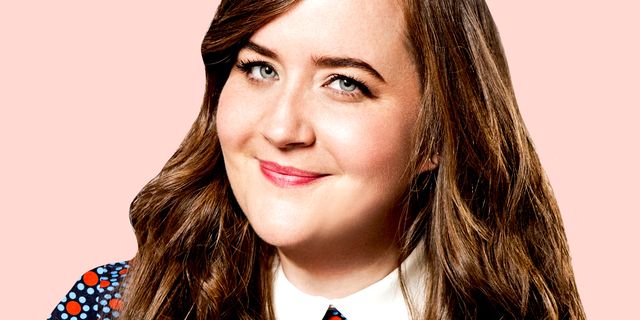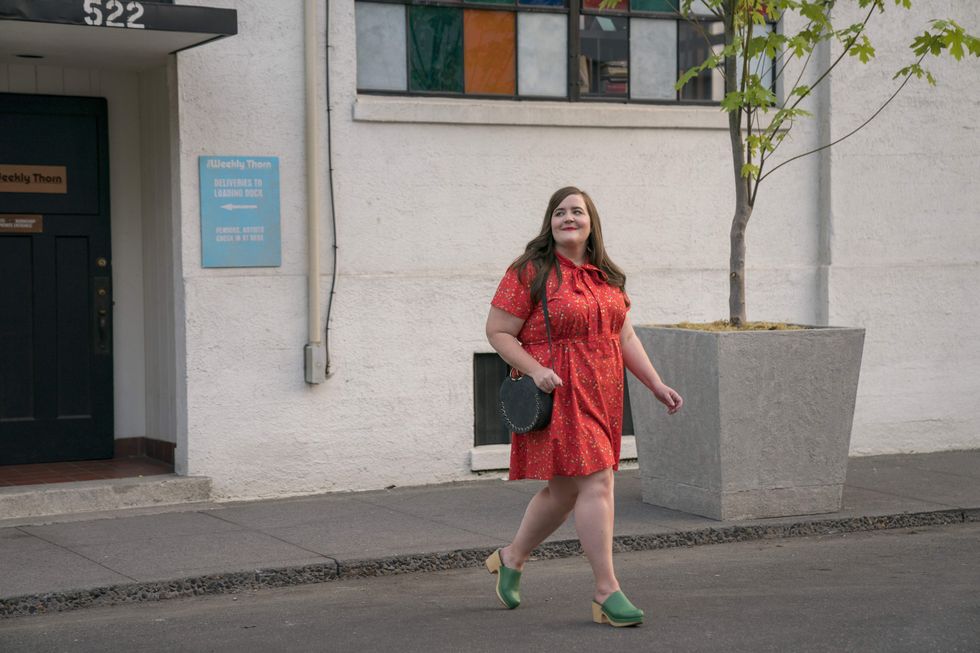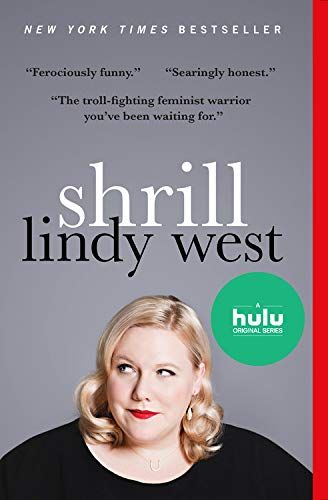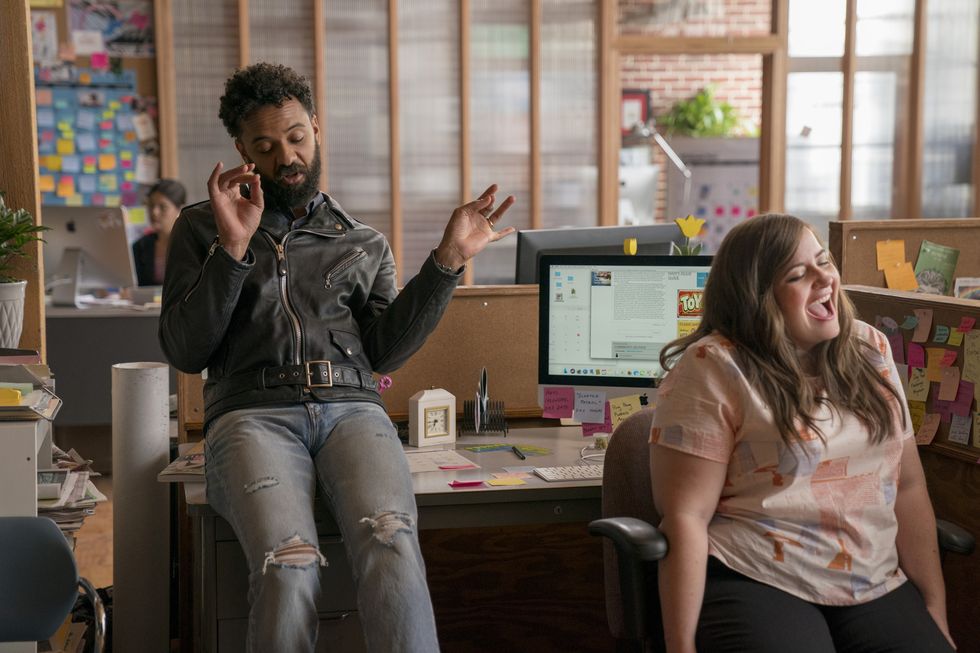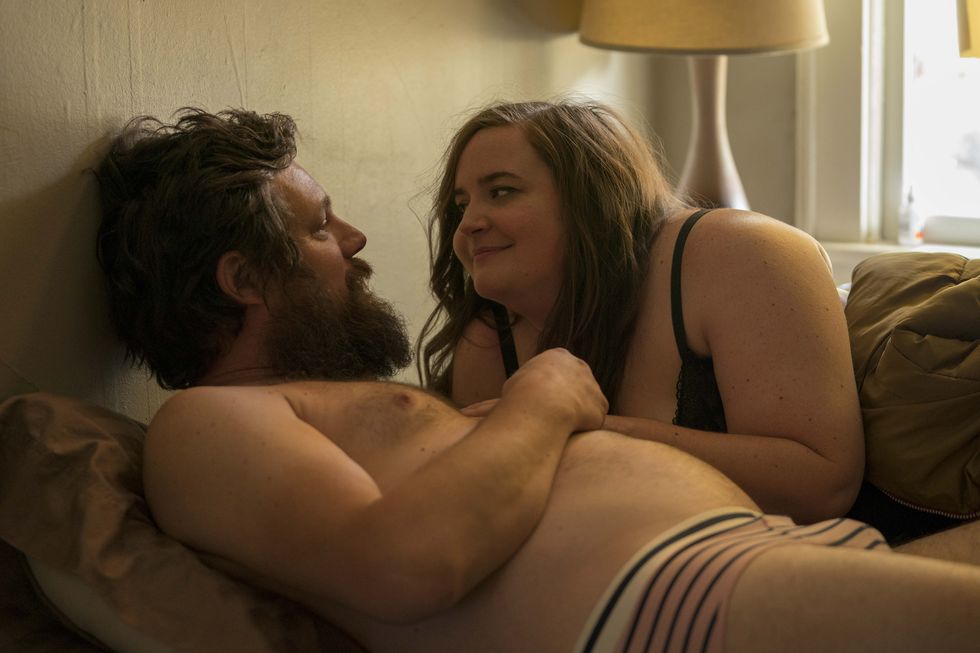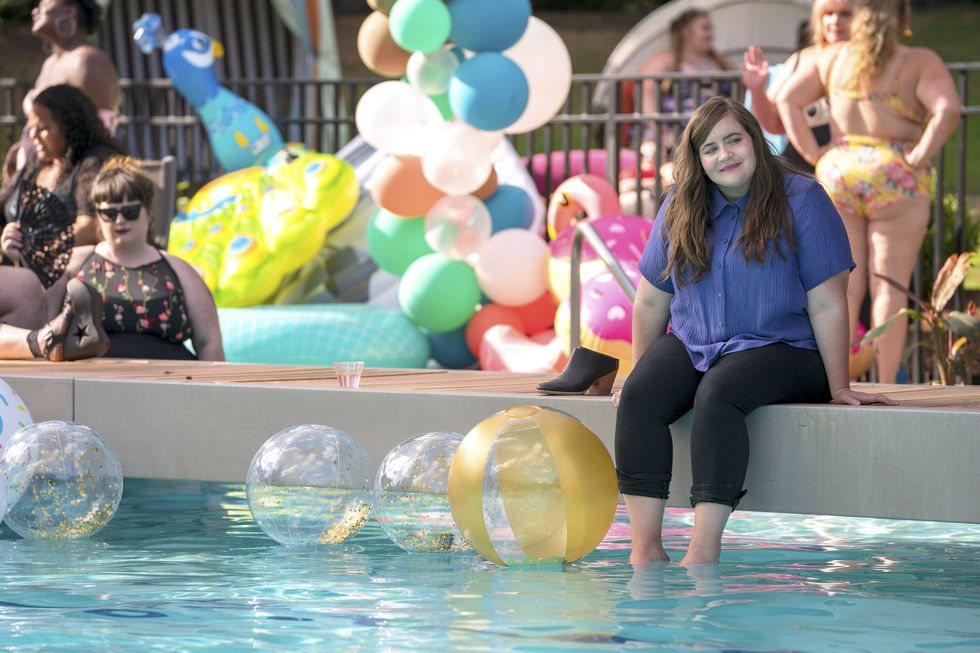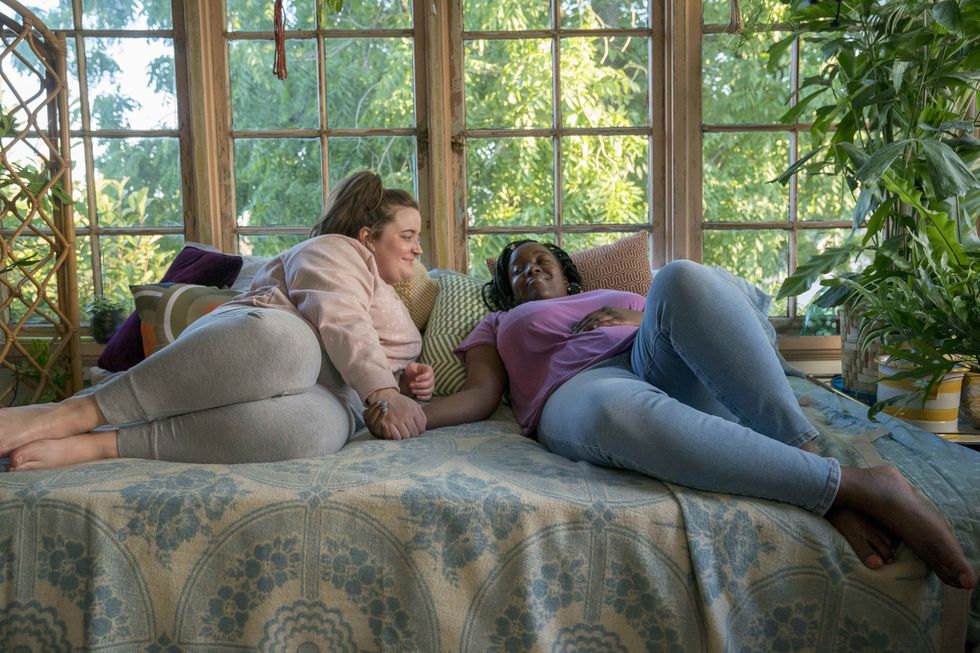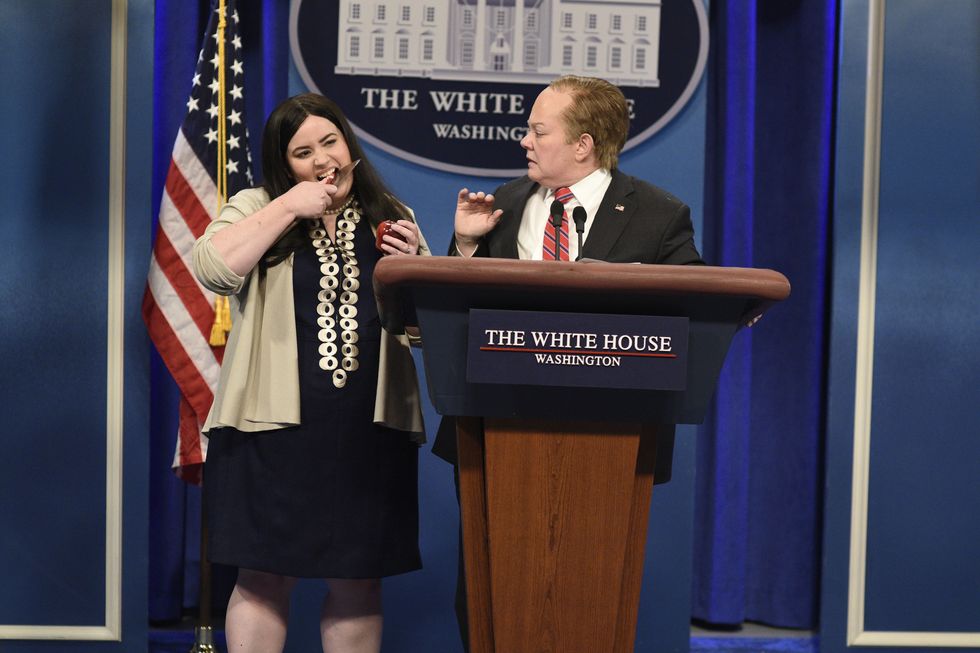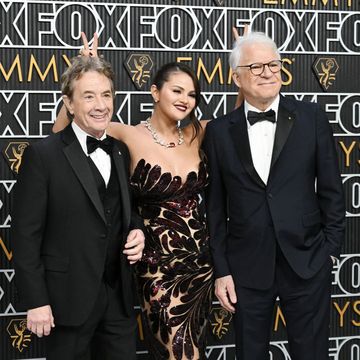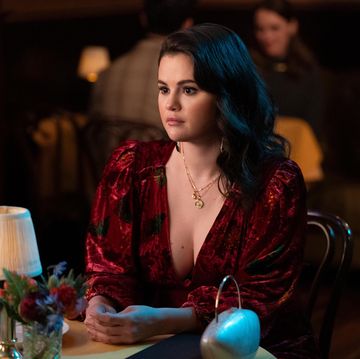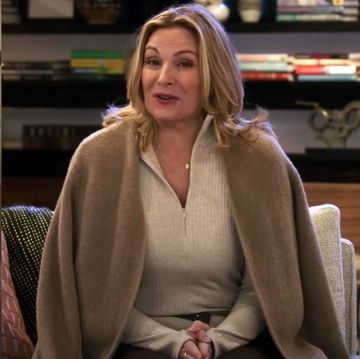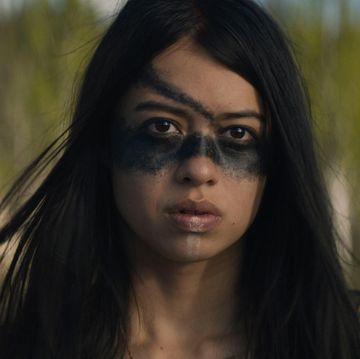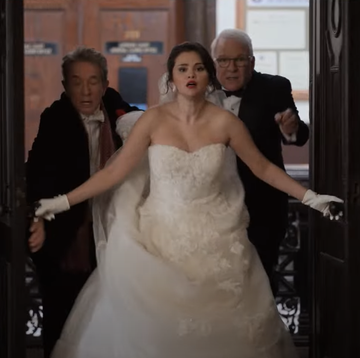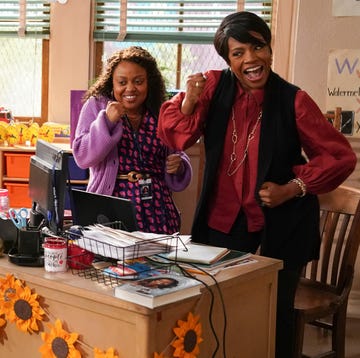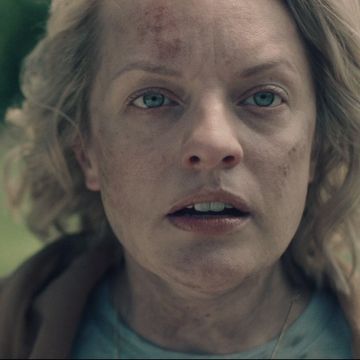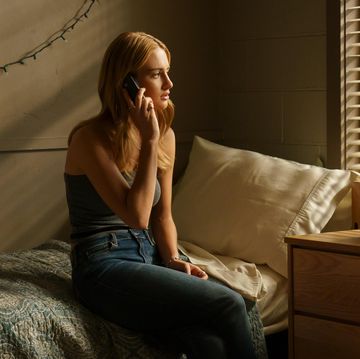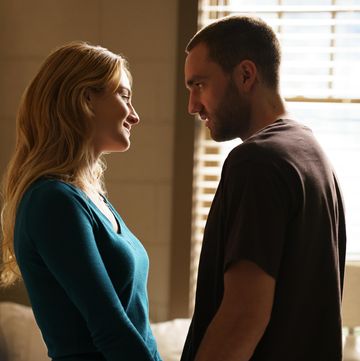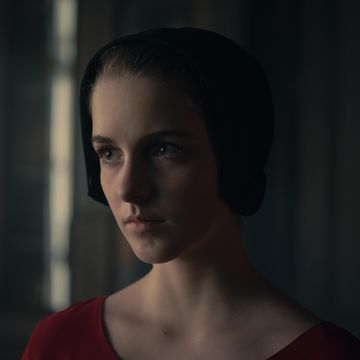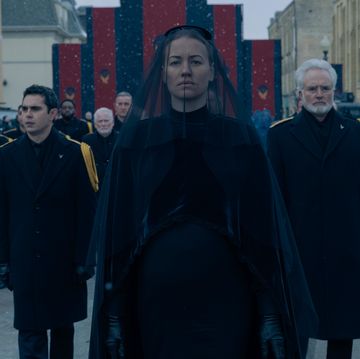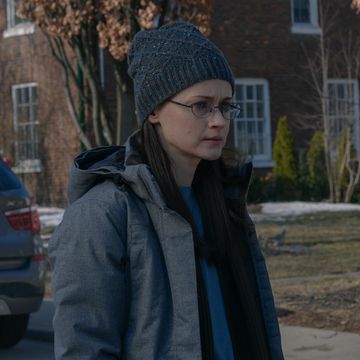The word fat shouldn’t feel like a scarlet letter. Aidy Bryant not only knows it—she feels it, too: “I think for a lot of my life, I was extremely afraid of being labeled with that word.” But, she says, “it's probably gonna be hurled at me forever [while] I'm on screen, and I can either let it cut me to my bone or be like, ‘Guess what? I am fucking fat, and you have to deal with it.’”
Can people let fat women live? Truly, because I’m tired. Can they let us be messy, normal, boring people, no weight-loss quest required? Several TV series centering on fat women have launched in recent years, but even the most well-intended focus on the character’s weight as a barrier, a source of shame, or comedy; needing to lose weight, or wanting to, remains their central driving force. Dietland, This Is Us, Huge, Insatiable (to an extent)—heck, even Mike and Molly met at Overeaters’ Anonymous. With the exception of The Little Mermaid’s Ursula (an animated character), Miss Piggy (a puppet), and Roseanne (yikes), you’d be hard-pressed to think of a character or series, or even a movie, containing a fat woman who was just fine with her body. Honestly, it’s sort of bonkers.
That is kind of the point of the show Shrill, which begins streaming on Hulu today, and also the conversation I wanted to have with its star, Saturday Night Live scene queen Bryant. When its source material, Shrill: Notes from a Loud Woman, was published in 2016, author Lindy West revived a conversation about society’s continued delegitimization of fat women, especially those who refused to live quietly or with shame. And it did so loudly, making the trolls more than a little bit cranky.
“Lindy did an incredible job of crystallizing that and verbalizing it,” Bryant says. We’re on an over-tufted couch, perfect for a sociopolitical dish session, in the Langham Hotel’s Tap Room Bar in Pasadena, where she was stationed in early February for the Television Critics Association Press Tour. “Lindy and I both have talked a lot about not seeing role models or, beyond role models. Like, a dignified fat woman on TV who's just a person—a human being who has a normal life.”
Which is exactly what makes Shrill feel so refreshing. Look at this lady, being fat and living her life! Weight loss or coming to terms with it are not her sole reason for existing—extraordinary! Until now, this has somehow been impossible for Hollywood to grasp. This show follows Annie (Bryant), your average young woman on the cusp of self-actualization. The world bristles at her body, but the point of the show isn’t finding the smaller person within or “embracing her curves.” It’s how this particular fat woman actually just...lives. It’s funny and heartwarming and enraging and fun, and it’s exactly the representation we need. Mostly, it’s about taking up space in the world and allowing yourself to do it, even when others might prefer you didn't. “I’ve got big titties and a fat ass,” Annie declares in bed with Ryan (Luka Jones). “I make the rules!”
So, Annie’s in charge. She’s got a job she likes, and friends she loves, and men that want to sleep with her (and not in a potentially creepy, fetishizing way). Yes, she’s fat, but Shrill’s not about that: It’s about a woman taking flight in the face of a whole bunch of socially interred crap. “In a lot of ways, this is a really traditional television show,” Bryant says, her shiny magenta heels bouncing as she talks. “It's a girl with her job and her boss and her boyfriends and her friends...really, it's Mary Tyler Moore. But the person at the center is the thing that makes it different. That point of view is what is important.”
While a beloved star of America's best known sketch series probably couldn’t be said to have a normal life, Shrill came along when Bryant was doing plenty of fairly average things. Like getting married in April 2018 to her longtime boyfriend, Conner O’Malley, and heading on a honeymoon to Italy; that’s where she heard Shrill had been picked up.
“At like 3 A.M. Italy time, I’m like ‘Hello? Yes, I'm on the call. Let's talk about how we make a TV show!’” It didn’t slow down from there. “The day I got back, I packed a bag, went to L.A., and we started the writer's room that week and wrote for two months.” She spent another two months shooting the series in Portland, then immediately left for the Emmys the next day. The day after that? Back at SNL. “It was really wild. It was certainly probably not healthy. By the time I got to Christmas I was like, ‘Good night, everybody! I’m going to bed for a month.’”
So much for that old adage about fat people being lazy. It’s an idea that’s reinforced not only by depictions of fat women across media, but also the negative treatment of them deemed acceptable in everyday life: macro and micro-aggressions, like eyerolls, glances, comments over food. (Why does the weed doctor need to tell me to lose weight? Seriously, what’s that about?)
Bryant feels some sort of way about it, too. A few hours before we met, Shrill's team had spent an hour at the TCA Press Tour going back and forth with reporters. Bryant, West, and Elizabeth Banks, an executive producer on the show, fielded questions about their looks. Still, Bryant remains gracious. She’s not bothered or put off by these questions, because she knows it’s part of the deal. The idea of looking at a fat person as “normal” shouldn’t feel revolutionary, but it does.
“Elizabeth. You've been gorgeous your whole life,” one female journalist asked Banks on the press tour. “What did you understand about this material?” The question was followed up later by another, male, journalist. “I find it amazing hearing the two girls...talking about, you know, ‘Yes, I'm fat, and you know what, I'm gonna own the world.’ But what about for you?”
Banks took it in stride. “Well, I hope it doesn’t surprise anyone that I'm not always super-comfortable in my own skin, either. I remember when I first came to Hollywood…[an agent] told me that I should get a boob job. I left the meeting. I did not get a boob job. I decided that I was gonna be happy and comfortable with who I was. And that's what this character, Annie, decides for herself. So I think it's something that everyone can relate to.”
“You're not the only person who has asked me about that today,” Bryant laughs. “I am fully understanding that change doesn't come overnight,” she says. “I don't know that the show would have been made even five, six years ago.” That’s exactly why she believes Shrill should exist. “Change is slow, and that is one thing that I hope the show can do: create a sense of empathy and allow maybe someone like that to watch the show and be like, ‘Oh, that's a person with feelings, thoughts, relationships, a family,’ and not just be like, ‘These freaking trolls are by this Barbie!’”
Bryant loved West's book and heard it was being adapted for TV. Instantly, she knew she wanted to be involved; to bring that lived-in, fat girl experience that wasn’t all about a scale or a number, to the screen. But after writing and producing her own pieces at SNL, she wasn’t content to just show up and act. She wanted to take this story to a broader audience; to evangelize, and entertain without taking away what made the project so personal to her. “Where some might be turned off by reading a feminist book, they might be more willing to sit down and watch a show and encounter ideas like this.”
Given the lack of nuance so often afforded to fat characters, Bryant’s conviction about being more than the actress in the role makes a lot of sense. Frankly, it's also inspiring to see more women owning their abilities and talents, and demanding they be taken seriously regardless of what they look like. “We felt a lot of responsibility to get it right,” Bryant says of also being a writer on the show, “and I think we were the ones qualified to do it.”
Within the series’ six episodes, it feels certain they were: Annie is confronted by a priggish boss and strangers upset with her body, but she isn’t here for that shit, and she’s not running around trying to remedy her form. For the most part, Shrill is about how hard she falls in love with her own self-discovery, and her hilariously delightful friendship with her roommate, Fran (Lolly Adefope). It’s a new level of energy and empathy for fat characters and their stories. And that feels like a marked change in a world where people can’t seem to grasp the idea that all women—let alone fat women—aren’t looking for approval to exist.
Americans have dehumanized fat people to such a degree that even showing a fat person eating—something Bryant’s portrayal of Sarah Huckabee Sanders did in an act of Indiana Jones–esque menace on SNL—was interpreted as an attempt to shame and humiliate the press secretary. “I think the American public, and probably the public in general, is not used to seeing fat women on TV,” Bryant says. “In order to do any other kind of work later in my career, I almost felt like I had to do something like this to acknowledge it, talk about it, and put it on the table so that I can move past it.”
There’s a moment in Shrill where Annie, feeling both fed up and empowered, decides to not ask for permission and just does what she likes. The resulting story doesn’t focus on the external reaction to her big moment, but digs far deeper into the psyche of a person constantly otherized by society, trying to stand up anyway. Bryant puts it plainly: “We really made an effort to not make Annie a mess in the traditional sense. You often see female characters that are like, ‘I don't even know how to put my clothes on, I'm so crazy and messy!’”
Bryant wanted to do something different. “She has a great friends, great family, she has a real sense of herself. She has style, she’s cool, she has personality, she's smart, and she’s funny—but she can't see any of it. I think that's a new kind of mess to look at. An internal mess.” So, just regular old life, in other words.
Shrill is streaming on Hulu now.
